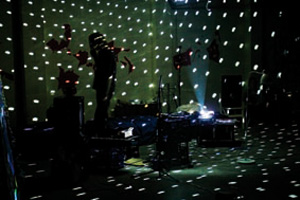Artist-run initiatives come in many colours, but few have been as vibrant – or as controversial – as the Brisbane-based Audiopollen Social Club. A night at the APSC meant an evening filled with, as one email-out put it, ‘underground noise. improvisation. social music. outsider activity. intervention. food. mad pride. film. psychedelic. relaxing. and TAD’. Audiopollen’s emails function as important traces of these strange do-it-yourself happenings. Largely manifesting from the mind of Joel Stern, APSC co-founder (with Yusuke Akai), these poetically informal missives variously invited, informed and forewarned audiences about the ‘PSYCH-NOISE-DADA implosion’ they could expect at the club’s ‘very special meeting of minds crossing tracks, taste, borders, seas … ‘

Experimental expanded projections at Audiopollen, West End, Brisbane, 2007. Image courtesy the artists. Photograph by Steve Trigg.
Line-up notifications were often near-impenetrable, their surreal expression reflecting unpredictable creative energies of the collective’s weekly work. ‘high level blowouts?’ asked one; ‘come rain or shine… come on Sunday’. ‘come again???’, read another. Nonconformist, uncompromising and often incomprehensible, for those with an interest in Australian art history, the APSC is also the latest Brisbane contribution to a tradition of artist-run initiatives which crystallise around sonic experimentation.
Though often flying beneath the radar, this kind of libertine, hyper-creative ARI has been critical to the ecology of sound in Australian art. Initiatives like the APSC represent a ‘current of work’ that develops ‘both outside of galleries, dealerships, and salesrooms, and in a non-unilateral relationship with such structures’, and emphasises ‘lived practices (performances, events, happenings, behaviours, sociabilities, communicational acts) [which] supplant …fixed objects as the primary instance of the work’.[1] In Australia, key infrastructure for this sociable ‘current of work’ was established in Melbourne in the late ’70s and early ’80s with the critical cross-fertilisations between ‘new music’, experimental art scenes, punk, and later, post-punk.[2] As with their beloved Aussie Rules football teams, musical Melbournites supported a host of tribes, including the industrial music centred in bayside St Kilda, and the northside ‘little bands’ scene from around North Fitzroy.
[For more, read the special Arts of Sound November 2009 Issue of Art Monthly Australia www.artmonthly.org.au]
Danni Zuvela
Danni Zuvela is passionate about experimental film and music. As OtherFilm, with Joel Stern and Sally Golding, she explores this passion through happenings, research, arguments and experiences.
References
[1] Matthew Fuller, Media Ecologies: Materialist Energies in Art and Technoculture, MIT Press, Massachusetts, 2005, pp. 73-74.
[2] Julian Knowles, ‘Setting the Scene: Developments in Australian Experimental Music since the Mid-1990s’, in Gail Priest (ed), Experimental Music: Audio Explorations in Australia, UNSW Press, Sydney, 2008, p. 15.
 This work is licensed under a Creative Commons Attribution-NonCommercial-ShareAlike 2.5 Australia.
This work is licensed under a Creative Commons Attribution-NonCommercial-ShareAlike 2.5 Australia.






